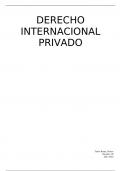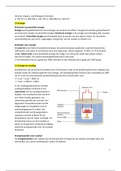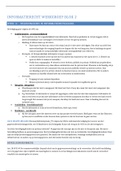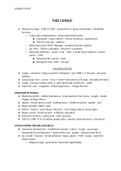HNH-36806
valE
n
tio
u rcI
b
O
esgIntroduction
T
d
D
Su
ppl
em
ent
s
Sport specific
nutrition
Balanced diet
Cycle of sports sciences
Importance of sports nutrition: good food choices will not make a mediocre athlete into a champion, but poor
food choices may prevent the potential champion from realising his/her potential
Balanced diet Sport-specific nutrition Supplements
To support healthy & active To optimize performance and Final winning edge
lifestyle recovery To supplement your diet
Sufficient energy intake Macronutrients/fluid → should never be main focus
Adequate macronutrients Timing of nutrient intake Be critical, backed-up by science
Sufficient fluid intake Discuss with experts
Adequate micronutrients Normal foods → would this work for me?
→ varied diet Sport nutrition products
Types of athletes
Explosive power weightlifter
Phosphagen system sprinter
Anaerobic middle-distance
Aerobic capacity endurance athlete
Multiple sprints gameplayer
5-5-2020 12:43 1 - 59
,It is hard to measure performance
Validity accuracy
Resembles performance that is stimulated
Correlation, prediction
Reliability precision
Correlation
Sensitivity
To detect small but important differences
Endurance performance: time to complete a certain task
Endurance capacity: exercise time to volitional fatigue
External factors to control when doing performance testing
Familiarization
Verbal encouragement
Music
Feedback
Additional measurements
Diet
Exercise
Dietary standardization Exercise standardization
Provide standardized meals Training status of subjects
Measure intake of nutrients during study Habitual training
Report dietary intake (compliance) Last exercise bout
Choose between measuring relative or absolute
exercise intensity
5-5-2020 12:43 2 - 59
,Energy metabolism I & II
kJ
+¿+energy (31 )¿
mol
ATP+ H 2 O → ADP+ P i+ H
ATPase
Sources of energy
ATP breakdown Phosphagen system
Phosphocreatine (PCr) → creatine + Pi
Anaerobic glycolysis glucose-6-P → lactate Substrate-level phosphorylation
Oxidative phosphorylation CHO, fat, proteins, alcohol
ATP re-synthesis
Rate Capacity
Delay
(mol/min) (mol)
Phosphocreatine 4.4 Instantly 0.67
Anaerobic glycolysis 2.3 5-10 s 1.6
Oxidative metabolism
Glycogen ~1.0 Minutes 84
Blood-borne glucose 0.34 ~90 min 19
Lipids 0.40 > 2 hours* 4000
* Lipid oxidation for ATP re-synthesis starts instantly when starting exercise, but lipid metabolism only 100%
active after 2 hours
1 Relative contribution of energy systems 2 Absolute contribution of energy systems;
total ATP resynthesis speed declines; decreased performance
ATP breakdown hydrolysis of the ATP that is stored in the body
Phosphocreatine breakdown
Activation: ratio ATP/ADP ↓ because of ATP breakdown
Inhibition: ratio ATP/ADP ↑ because of aerobic ATP
production ↑ or ATP utilization ↓
Recovery within 4 minutes after exercise, all PCr restored
Oxygen dependent!
5-5-2020 12:43 3 - 59
, Glycolysis (anaerobic; O2 independent pathway)
Glycogenolysis glycogen as substrate yields 3 ATP (50% more!)
Glycolysis glucose as substrate yield 2 ATP
Acetyl-CoA goes into citric acid cycle (TCA-cycle); aerobic metabolism
When oxygen is limited; pyruvic acid → lactic acid
Maximum not reached until after 5 seconds
Maintained up to 30 seconds
Rate lower (2x), but size higher (4x) compared to PCr lower power
output
Goals of glycolysis
ATP synthesis
NAD regeneration (H+ carrier); to keep glycolysis running
Phosphofructokinase (PFK)
Inhibited by: ATP ↑ , PCr ↑ , citrate ↑
→ accumulation of glucose-6-P → inhibits hexokinase
Stimulated by: ADP ↑, AMP ↑, fructose-6-P ↑
5-5-2020 12:43 4 - 59






